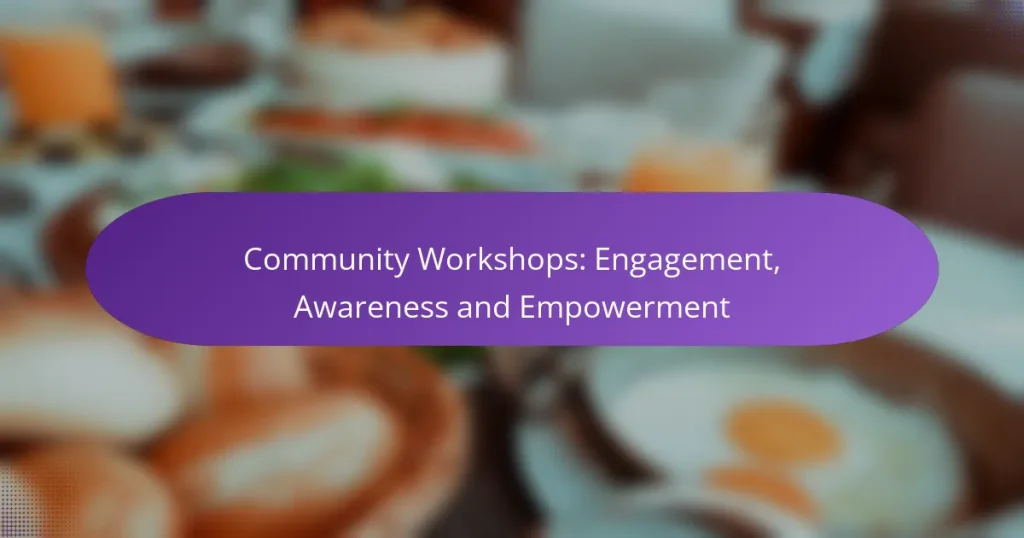Community workshops serve as vital platforms for enhancing engagement, awareness, and empowerment within local communities. By facilitating direct interaction and collaboration among participants, these workshops not only promote skill development but also encourage a deeper understanding of local issues. With a focus on clear objectives and audience needs, they create meaningful opportunities for individuals to connect and contribute to community development.
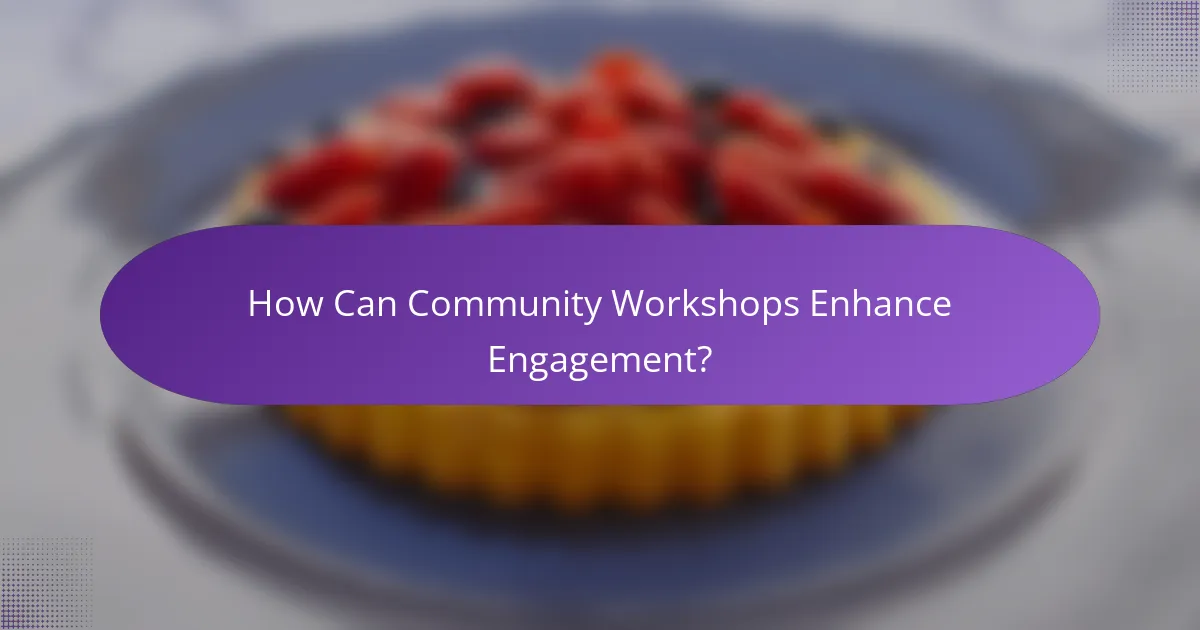
How Can Community Workshops Enhance Engagement?
Community workshops enhance engagement by fostering direct interaction among participants, encouraging collaboration, and creating a sense of ownership in local initiatives. These workshops provide a platform for individuals to share ideas, learn from one another, and actively participate in community development.
Interactive Activities
Interactive activities are essential in community workshops as they promote active participation and engagement. These can include group discussions, role-playing scenarios, or hands-on projects that allow participants to express their thoughts and creativity.
Consider incorporating icebreakers or team-building exercises to break down barriers and encourage openness. For example, a simple activity like a “human bingo” can help participants learn about each other in a fun and engaging way.
Collaborative Projects
Collaborative projects allow participants to work together towards a common goal, enhancing community ties and fostering teamwork. These projects can range from community gardens to local art installations, providing tangible outcomes that reflect the collective effort.
When planning collaborative projects, ensure that roles are clearly defined and that everyone has an opportunity to contribute. This can be achieved through brainstorming sessions where ideas are shared and refined collectively.
Feedback Sessions
Feedback sessions are crucial for assessing the effectiveness of community workshops and ensuring continuous improvement. These sessions provide participants with a chance to voice their opinions and suggest changes for future workshops.
To conduct effective feedback sessions, consider using anonymous surveys or open forums where participants can freely express their thoughts. Aim for a mix of qualitative and quantitative feedback to gain a comprehensive understanding of the participants’ experiences.
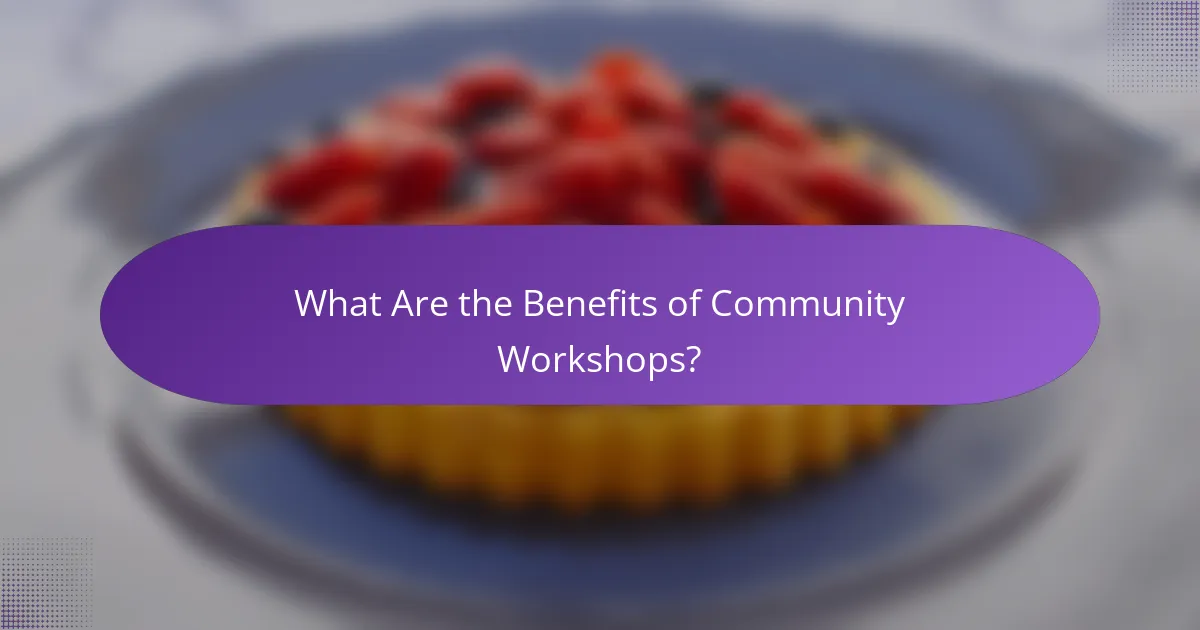
What Are the Benefits of Community Workshops?
Community workshops offer numerous benefits, including skill enhancement, networking possibilities, and increased awareness of local issues. These workshops empower participants by providing hands-on experiences and fostering connections within the community.
Skill Development
Community workshops focus on practical skill development, allowing participants to learn new techniques or improve existing abilities. Workshops can cover a wide range of topics, from financial literacy to arts and crafts, catering to various interests and age groups.
Engaging in these workshops often involves hands-on activities, which can enhance retention and application of skills. For example, a cooking workshop may teach participants how to prepare healthy meals, while a coding workshop could introduce basic programming concepts.
Networking Opportunities
Attending community workshops creates valuable networking opportunities, connecting individuals with similar interests and goals. Participants can meet local experts, mentors, and peers, fostering relationships that may lead to collaborations or job opportunities.
These connections can be particularly beneficial for entrepreneurs and job seekers. For instance, a workshop on small business management may allow aspiring business owners to network with established entrepreneurs who can offer guidance and support.
Increased Awareness
Community workshops help raise awareness about local issues, resources, and initiatives. By participating, individuals gain insights into challenges faced by their community and learn about available support systems.
For example, a workshop focused on environmental sustainability may educate attendees about local recycling programs and conservation efforts. This increased awareness can inspire participants to take action and contribute positively to their community.
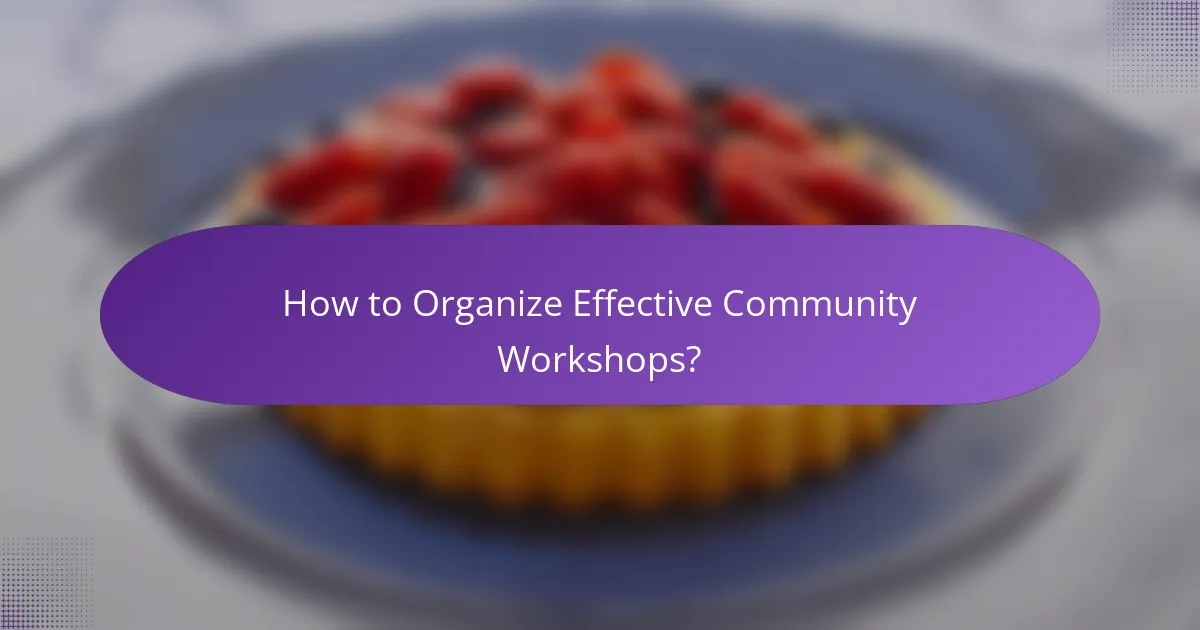
How to Organize Effective Community Workshops?
To organize effective community workshops, focus on understanding your audience, defining clear objectives, and selecting a suitable venue. These elements are crucial for fostering engagement and ensuring the workshop meets its goals.
Identify Target Audience
Understanding your target audience is essential for tailoring the workshop content and format. Consider demographics such as age, interests, and community needs to ensure relevance.
Engage with community members through surveys or informal discussions to gather insights. This feedback can help you identify specific topics and formats that will resonate with participants.
Set Clear Objectives
Establishing clear objectives gives direction to your workshop and helps measure its success. Define what you want participants to learn or achieve by the end of the session.
For example, if the goal is to raise awareness about local resources, ensure that the content is informative and actionable. Use SMART criteria—Specific, Measurable, Achievable, Relevant, Time-bound—to frame your objectives effectively.
Choose Appropriate Venue
Selecting the right venue is critical for creating a comfortable and accessible environment. Consider factors such as location, capacity, and facilities available to accommodate your audience.
For community workshops, venues like local community centers, libraries, or schools often work well. Ensure the space is equipped with necessary resources like seating, audio-visual equipment, and accessibility options for individuals with disabilities.
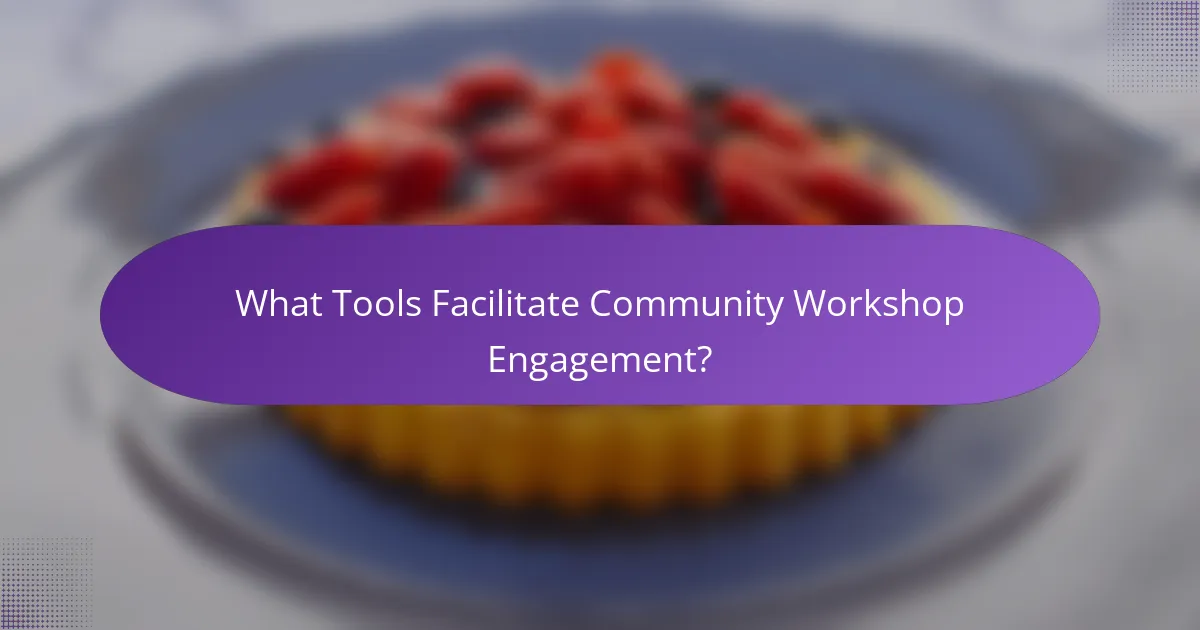
What Tools Facilitate Community Workshop Engagement?
Effective community workshop engagement relies on various tools that enhance participation and interaction. These tools can help organizers create a more inclusive and dynamic environment, fostering collaboration and feedback among participants.
Online Platforms
Online platforms serve as vital tools for community workshops, enabling participants to connect regardless of their physical location. Popular options include Zoom, Microsoft Teams, and Google Meet, which facilitate real-time discussions and presentations.
When choosing an online platform, consider factors such as user-friendliness, accessibility, and features like breakout rooms for smaller group discussions. Ensure that the platform supports the number of participants expected, as some may have limitations on attendee capacity.
Interactive Tools
Interactive tools enhance engagement by allowing participants to contribute actively during workshops. Tools like Mentimeter, Slido, and Kahoot! enable real-time polling, quizzes, and brainstorming sessions, making the experience more dynamic.
Incorporating these tools can help gauge participant understanding and gather instant feedback. Aim for a mix of activities that cater to different learning styles, ensuring that everyone has an opportunity to engage meaningfully.
Feedback Mechanisms
Feedback mechanisms are essential for assessing the effectiveness of community workshops. Surveys and feedback forms, such as Google Forms or SurveyMonkey, can be distributed post-workshop to gather insights on participant experiences and suggestions for improvement.
Consider using anonymous feedback options to encourage honest responses. Regularly reviewing feedback can help refine future workshops, ensuring they meet the needs and expectations of the community. Aim to implement changes based on feedback to demonstrate responsiveness and commitment to improvement.
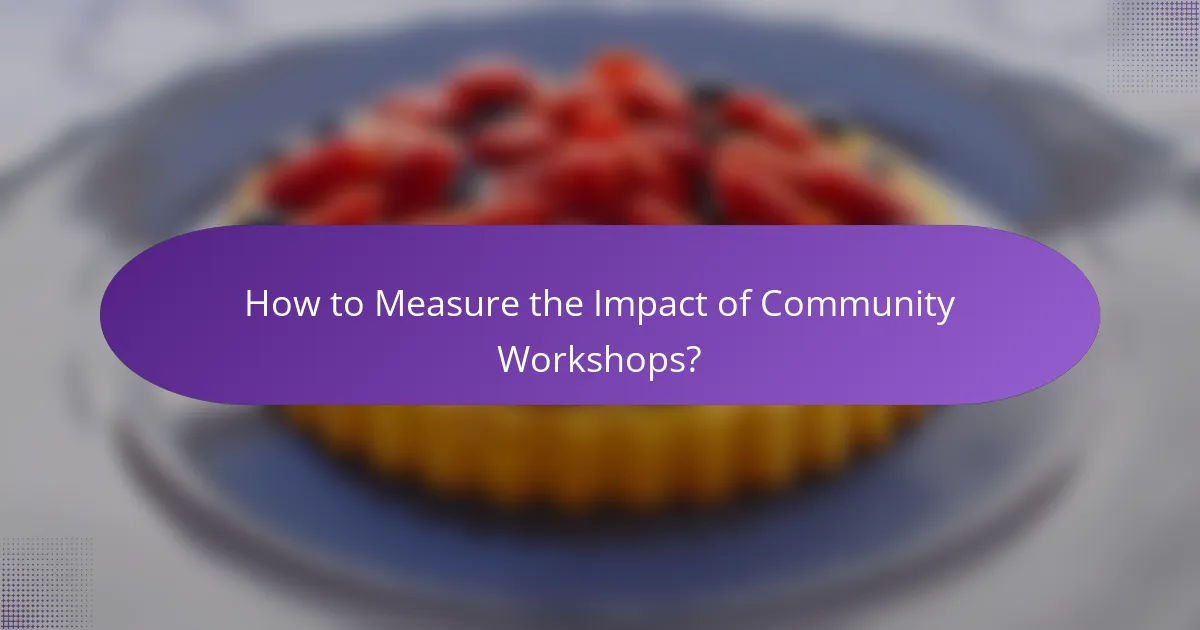
How to Measure the Impact of Community Workshops?
Measuring the impact of community workshops involves assessing participant feedback, engagement levels, and long-term outcomes. Effective evaluation methods provide insights into how well the workshops meet their objectives and foster community empowerment.
Participant Surveys
Participant surveys are a direct way to gauge the effectiveness of community workshops. These surveys can include questions about satisfaction, perceived value, and areas for improvement. Aim for a response rate of at least 50% to ensure the data is representative.
Consider using a mix of quantitative questions (e.g., rating scales) and qualitative feedback (open-ended responses) to capture a comprehensive view. Analyzing this data can help identify trends and inform future workshops.
Engagement Metrics
Engagement metrics track how actively participants are involved during workshops. Key indicators include attendance rates, participation in discussions, and completion of activities. High engagement often correlates with a greater impact on community awareness and empowerment.
Utilize tools like sign-in sheets or digital platforms to collect data on attendance and participation. Comparing these metrics across different workshops can highlight successful strategies or areas needing improvement.
Follow-Up Assessments
Follow-up assessments evaluate the long-term effects of the workshops on participants and the community. This can involve re-surveying participants several months after the event to measure retention of knowledge and behavioral changes.
Consider implementing follow-up interviews or focus groups to gather deeper insights into how the workshops influenced participants’ actions or community involvement. Tracking changes over time can provide a clearer picture of the workshop’s overall impact.
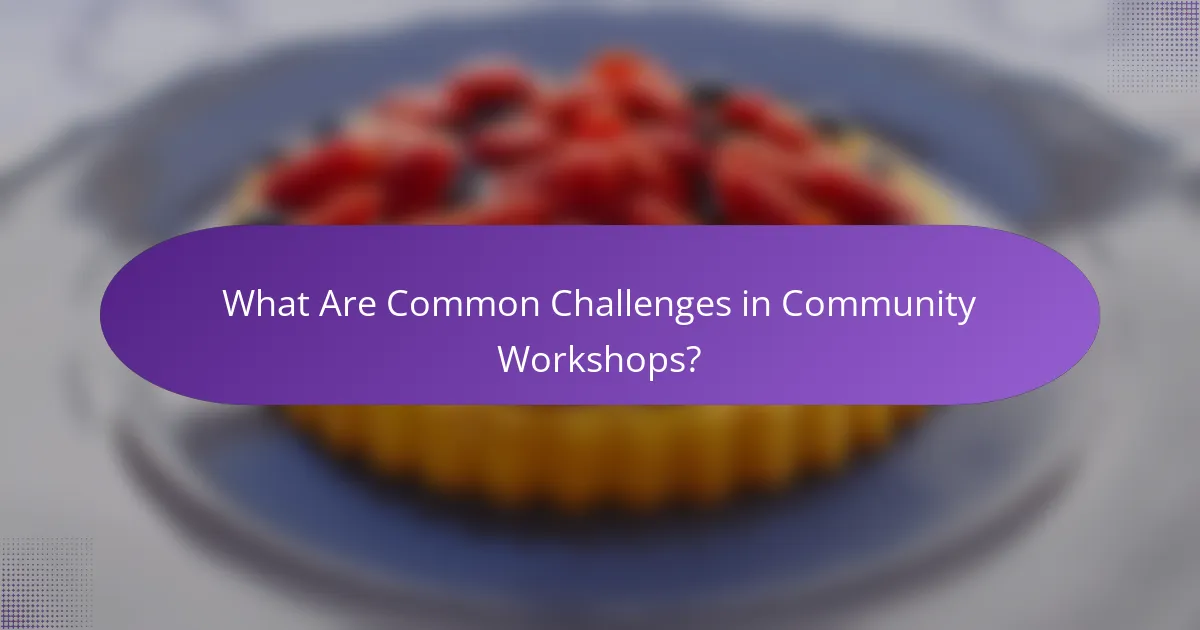
What Are Common Challenges in Community Workshops?
Community workshops often face several challenges that can hinder their effectiveness, including low attendance, engagement issues, and resource limitations. Addressing these challenges is crucial for fostering meaningful community involvement and achieving workshop goals.
Low Attendance
Low attendance is a frequent challenge for community workshops, often stemming from a lack of awareness or interest among potential participants. Factors such as scheduling conflicts, insufficient promotion, and unclear benefits can contribute to this issue.
To improve attendance, organizers should consider targeted outreach strategies. Utilizing social media, local community boards, and partnerships with local organizations can help raise awareness. Additionally, offering workshops at various times and locations can accommodate different schedules and increase participation.
Engaging potential attendees with clear messaging about the workshop’s benefits can also boost interest. Highlighting practical outcomes, such as skill development or community improvement, can motivate individuals to attend. Regular follow-ups and reminders can further enhance turnout rates.
